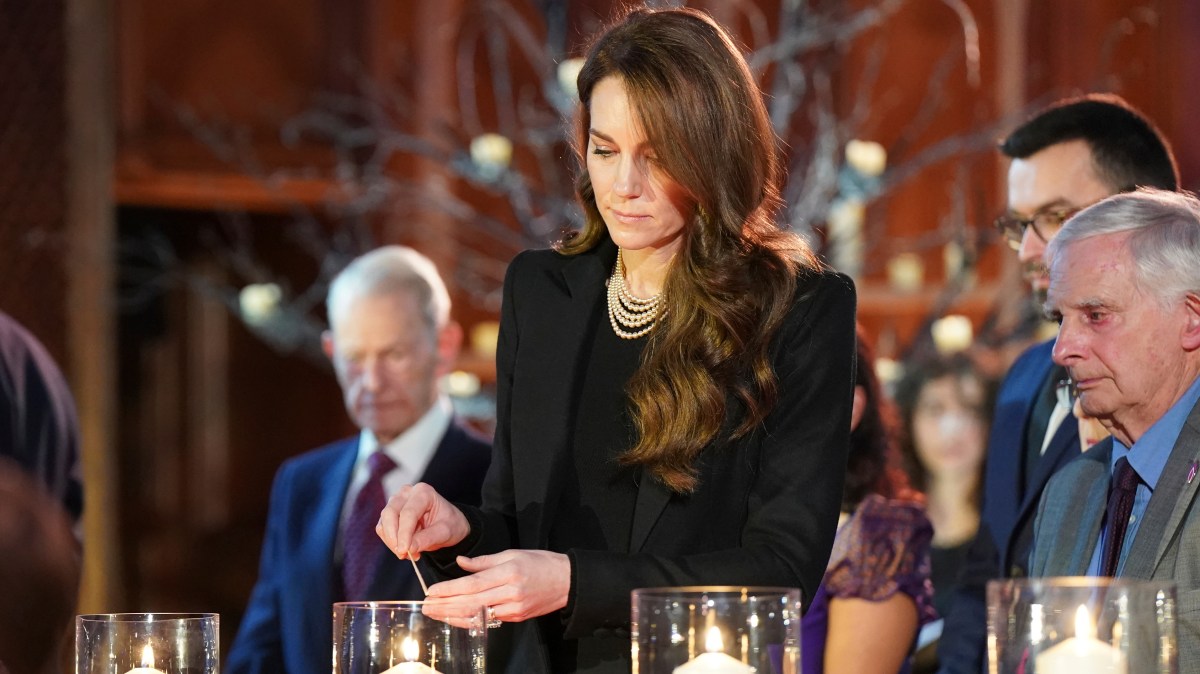Even a prince and princess were privileged to be in such company. As the heir to the throne and his wife entered London’s Guildhall for the British commemoration of Holocaust Memorial Day, the crowd stood for the royalty — but William and Kate deferred to the survivors who were seated before them.
“It has been a great honour for Catherine and I to join you all today,” the Prince of Wales said, as he pledged that Britain would never forget the Holocaust and paid tribute to the bravery of the survivors who keep telling their stories.
At the culmination of the event, in all probability the last big anniversary to be attended by a significant numbers of survivors, the future king and queen took the memorial flame from those who had experienced these horrors and passed it to a generation who will carry it into the 22nd century.
The Prince and Princess arrived early to meet survivors
ARTHUR EDWARDS/REUTERS
That symbolic moment came at the end of a service that had been more than moving. To a backdrop of music which was beautiful, mournful and defiant, survivors of the Holocaust and other genocides gave their testimonies, and prayed that the lesson of their lives would never be forgotten.
They also pledged to keep telling their stories. After the service, Steven Frank, 89, who still has the yellow star the Nazis made him wear and has given nearly 1,000 talks in schools, said: “The work carries on.”
For the 70 or so survivors who attended, it was a long day. The prince and princess arrived early to meet them and this turned into a reunion. The princess recognised Yvonne Bernstein, 87, from the 75th anniversary and went to hold her hand.
“It was such a treat for me to come and see an old friend,” the princess said.
The prince also spoke of his great-grandmother, Princess Alice of Battenberg, who sheltered Jews during the Nazi occupation of Greece
ARTHUR EDWARDS/REUTERS
As the service began, the survivors looked up at the London Youth Chamber Choir, an image of the youth which the Nazis stole from them. The choir sang Even When He is Silent, a piece based on an inscription left by a Jew who hid in a cellar in Cologne.
“I believe in the sun, even when it’s not shining,” they sang. “I believe in love, even when I feel it not. I believe in God, even when He is silent.”
As their voices moved the medieval hall, the aisles filled with candles borne by a most varied cast. The Bishop of London held one, as did faith leaders of all creeds.
The ceremony was filled with testimonies. They spoke of lost parents, lost childhoods and the nightmares that “don’t go away”. And there was fear for the future.
The princess and Rachel Levy
REUTERS
“Right now it is very sad for us survivors,” said Rachel Levy, in a pre-recorded segment on the rise in antisemitism, Islamophobia and other forms of hate-fuelled violence and oppression. “We see ourselves in these people who are going through it.”
The Prince of Wales sought to reassure. “Their [the survivors’] bravery in sharing with us the most harrowing moments of their lives is extremely powerful. They ensure we never forget,” he said. “I assure them we never will.”
The Prince also spoke of his great-grandmother, Princess Alice of Battenberg, who sheltered Jews during the Nazi occupation of Greece. Reading from Heroes of the Holocaust, he related the story of how she hid an entire family while the Nazis were just metres from her home. She managed to wear down the authorities’ inquiries by exaggerating her deafness.
The Roma, the disabled, homosexuals and others who were murdered by the Nazis were also remembered
ARTHUR EDWARDS/REUTERS
Sir Keir Starmer also has a personal connection through his wife, Victoria, whose father’s family left Poland in the 1920s, leaving other relatives behind. On a visit to Auschwitz this month, both she and her husband looked for the family’s names in the records.
“It was harrowing,” Starmer said. “We turned page after page after page just to find the first letter of a name. It gave me an overwhelming sense of the sheer scale of this industrialised murder.
“The Holocaust was a collective endeavour by thousands of ordinary individuals utterly consumed by the hatred of difference,” Starmer continued. “And that is the hatred that we stand against today, and it is a collective endeavour for all of us to defeat it.”
It was not only the six million Jews who were remembered, but the Roma, the disabled, homosexuals and more who were murdered by the Nazis. As were those who died in the recognised genocides since: Cambodia, Rwanda, Darfur and, especially in this 30th anniversary year, Bosnia.
Two Bosnian-British survivors of the latter, Smajo Bešo and Sabina Kadić-Mackenzie, gave heart-breaking testimony of being taken from their homes and their fathers, and witnessing death while they were children.
At the very end, survivors of these genocides lined up behind candles and lit them. The prince and princess took a flame down to children assembled beneath the front of the stage, who passed it from one to another.
When the image was broadcast just before 8pm, it ignited a moment of national remembrance. Households across the country put their own candles in their windows while landmarks nationwide, from the Houses of Parliament to Edinburgh Castle, were illuminated in the day’s colour of purple.
The Houses of Parliament were among the national landmarks illuminated in purple on Monday night
AP PHOTO/KIN CHEUNG
After the service ended, Steven Frank thought about where he had been 80 years ago that day. “I didn’t know what was happening,” he said. “We were starving to death all over the place. I was nine years old.”
Eight decades on, he was still alive and he had witnessed a service he had simply described as “beautiful”.
The princess with Steven Frank
ARTHUR EDWARDS/REUTERS







